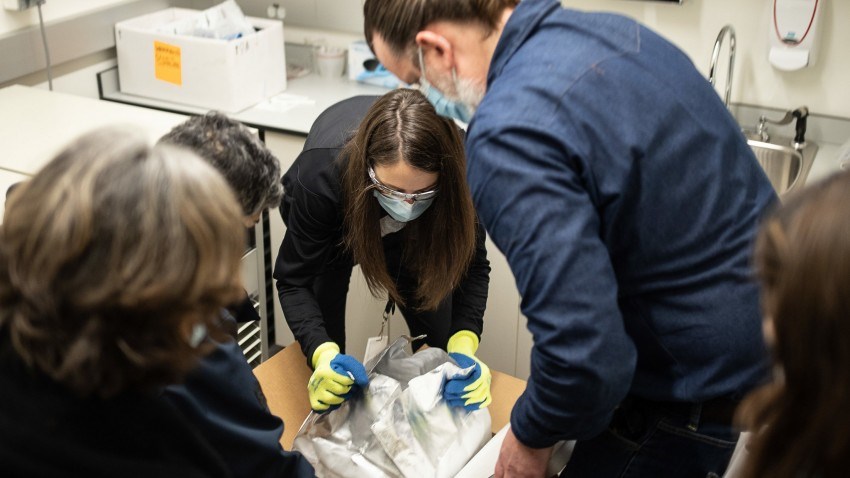Amid reports Pfizer Inc. (NYSE:PFE) is facing manufacturing challenges for its COVID-19 vaccine, officials in Ottawa are looking to reassure Canadians the country is on track to receive millions of vaccines by the end of March.
U.S. officials have been working with Pfizer this week to maximize production capacity after being informed of production issues, according to Reuters.
Maj.-Gen. Dany Fortin, who’s leading Canada’s National Operations Centre for vaccine distribution, said his organization is in contact with Pfizer on a daily basis and has received assurances four million vaccines are still due to be delivered by the end of March.
“Even if it's a quantity that is, perhaps, lower than you would expect if you were to break it down per week over the first quarter … delivery is going to pan out the way that we intended,” Fortin said during a Wednesday (December 16) media briefing with other officials in Ottawa.
Up to 249,000 doses of the Pfizer vaccine are expected to be delivered to Canada by the end of December, with administration of those doses having commenced Monday in Ontario and Quebec.
Another 168,000 doses of the competing Moderna Inc. (NYSE:MRNA) vaccine are also expected to be delivered by the end of the month, pending approval from Health Canada.
Deputy chief public health officer Dr. Howard Njoo said during Wednesday’s briefing that the Moderna approval “should be in the near future.”
He said the planning process for vaccine distribution has been moving forward under the assumption that the Moderna vaccine will be approved.
A total of six million doses are set to be delivered to Canada by the end of March: four million doses will come from Pfizer, two million doses will come from Moderna.
Both vaccines require that recipients are dosed twice, meaning that three million Canadians are set to be vaccinated in the next few months.
Meanwhile, Njoo said scientists are still trying to determine what would happen if someone took one vaccine the first time and followed up by taking the competing vaccine for the second dose.
One significant difference between the vaccines that is creating logistical challenges for delivery within Canada is the temperature at which they must be stored.
The Pfizer vaccine requires that it’s maintained in freezers at temperatures as low as -80C, making it more difficult to handle and transport.
The delivery of those vaccines will be handled by the manufacturer to the places of vaccination, initially in urban centres.
But because the Moderna vaccine is easier to transport — requiring freezing of only -20C — those will be prioritized for shipping in medical-grade freezers to Canada’s north as well as remote and Indigenous communities.
Ottawa has enlisted FedEx Express Canada Corp. and Innomar Strategies Inc. to deliver the Moderna vaccine to distribution points, which can then be distributed by provinces and territories based on instructions from the manufacturer.
Njoo said the potential for earlier-than-expected deliveries of the Moderna vaccine was especially good news for Canada’s remote communities.
So far, five -20C freezers have been delivered to the territories, according to Fortin.
But because of the logistical challenges with delivering Pfizer vaccines at -80C temperatures, the territories have declined to accept those doses and are instead opting for the easier-to-transport Moderna vaccines, according to Njoo.
He said in the spirit of collaboration, the provinces have agreed to shift the per capita proportion of Moderna vaccines to the territories to make distribution easier.
“It then becomes a logistical issue as well because certainly in some provinces that have quote ‘northern communities,’ you can see that at the end of the day, for those communities affected that there's really not much in difference in terms of their reality on the ground as opposed to quote ‘a southern community’ in a territory [that] might be separated by a few hundred kilometres or so,” Njoo said.
“So that's a discussion that's ongoing in terms of finer adjustment.”
About 4,000 Pfizer doses were delivered to B.C. late Sunday as vaccinations began Tuesday on the West Coast at two locations in the Lower Mainland: one within the Vancouver Coastal Health Region and one within the Fraser Health Region.
More deliveries to B.C. are set for the weeks of December 21 and 28.
Fortin said that as more deliveries roll in to Canada, the delivery process will have to be reviewed once again.
For now, his organization is co-ordinating dry runs of distributing the Moderna vaccine in anticipation that they’ll soon receive regulatory approval.
“It’s a complicated game of making sure that we do this as efficiently as possible, rapidly and safely,” Fortin said.




